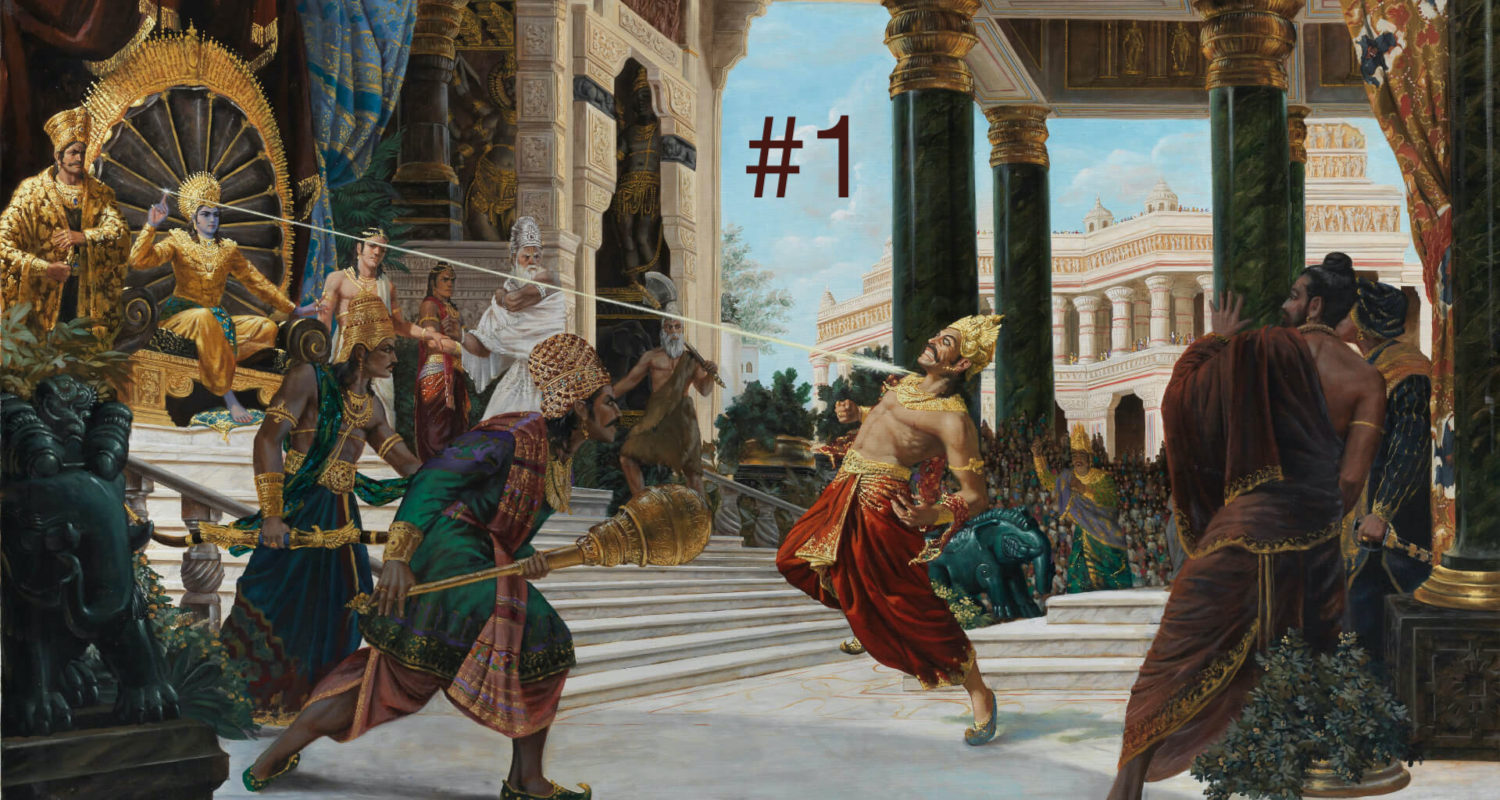This post is part of a series on the Mahabharat Epic. If you want to find the other parts, click here. These posts are all about my thoughts regarding the Epic and the greatest thing for me is the ability to connect with you, so, share your thoughts and opinions and let’s learn about this Epic together!
Disclaimer
This post got more attention than I imagined so I’d like to say a few words first. All of my thoughts and observations are from the old show. I haven’t done any reading prior which is why there may be inaccuracies in what follows. If you have any thoughts regarding the content, share them in the comments. I am keen on learning about this topic and exploring it from multiple perceptions. I have titled this particular blog ‘misconceptions’ because I believe that there are a few aspects of the show that are presented in a misleading way which leads to people potentially conceptualizing the wrong thing. However, I could very well be delusional in my judgement.
Intro
Hi friends! Recently, I’ve been watching a show called Mahabharat(1988) and it’s based on the famous scripture written by Sage Vyas who is a greatly respected sage due to the extraordinary poetic expression he’s been able to narrate in the story of the Mahabharat. The story itself is such a vast library of mini-stories and is impossible to consolidate into a single blog post. As it’s a hugely sought-after topic and is something precious to me, I intend to write a lot more individual learnings and bite-sized notes about the script for lessons we can learn from the epic.
The show itself is 94 episodes long but is well summarised and has an interesting perspective. Each episode is around 40 minutes long and is beautifully organised with various elements including:
- The narration at the beginning from ‘Time’ to help illustrate the situation and recall the events from the previous episode.
- Multiple simultaneous timelines to show the sequence of events and the variety of stories that are happening simultaneously. And the development of the concluding war is presented seamlessly and compellingly.
- The songs that play at various points to mark important events.
These are only some of the many magnificent presentation techniques used in the show. Though, I find that there are areas where they could easily cut out a few minutes of content and instead focus on the logical explanations behind some of the rather inconceivable events. This leads me nicely to the main chunk of this post.
Is it fictional?
Many people who see this epic as a fictional story and don’t believe it to be true. I have some thoughts to counter the argument.
So accurate with the specifics
If you pick any point in the show, you’ll find that there are mentions of specific terminology and numbers throughout. The names of individuals, the kingdoms, the various rituals and the specific events all tie in seamlessly. And considering the fact that despite how many years it has been, the facts have stayed consistent for the bulk of the time. This clearly highlights that the events would have been real. Some of the original names given to the locations of the kingdoms still exist today! That’s a great reminder that the land of India has provided ground to this great epic. I’m not going to fully declare that it’s true but I do believe that after such consistent bequeath of specific information, it most likely is true.
There are still some common misconceptions about the originality of this story and for that, we need to conceptualise 3 aspects.
Different people have different representations for a story – it’s all about imagination and creativity
Firstly, the story is from the year 3000BC. Get that ingrained in your mind. It’s old man! It’s many millennia of passing down such extensive scriptures. In such an extended timeline, it’s impossible to keep the original story. I mean think about it. If you were told a message to tell to another person, your ‘version’ would have a slight variation. And with 3-4 generations of passing that information down, the version varies vastly that it no longer resembles the original message. And this is just for 3-4 generations. In the case of the Mahabharat, we’re talking 1000’s of years! It’s a prolonged period of time. And during this time, the epic has gone through many hands and has evolved tremendously that each adaptation has a blend of imagination and creativity with it. Nothing matches the original verbatim. Creative minds like to add a flavour to show their creativity and so we get a mix of perspectives along the way. This is why we can’t believe everything in the show/books to be completely authentic. But again, I can’t guarantee the books because I haven’t read them. But I still believe that the same thing would be applicable for books.
Poetic expression can be misleading
Secondly, something that I believe is that authors, especially traditional writers of scriptures, were very linguistic and expressive with their language in their poetic forms that it involved some demystifying to obtain their true messages. Poems are elegant but are often cryptic for simple but effective reasons. It’s an art. And I strongly believe that this epic is no exception to this concept. I think that the early generations would have involved dense use of poetic literacy. And poetic expression can be misleading to the general public. They may believe a particular sentence or phrase to be true to the word if they don’t know about it. For example, one of the sentences might’ve said that ‘Lord Krishna blew his flute as beautifully as a thousand leaves raining with lush greenery.‘ (My poetic skills are weak so bare with me). But, this sentence clearly highlights that he blew it so beautifully. Although, some people conceive the exact phrasing to be true. They may wonder that he really did blow his flute in a way that a thousand leaves fell. Unfortunately, there are many people who believe in such poetic expressions as reality and this is one of the primary misconceptions that has created an artificial and fictional atmosphere.
Even in the show, there are many areas that present the scenery in a way that literally copies the poetic version and makes it seem unrealistic. For example, there are many scenes which show Arjun(one of the main characters) firing an arrow to make it rain and so on. No matter how much you persuade me, I’m not going to believe that. But the creators use such scenes to connect to the audience and imply to them that Arjun is a great archer. Except they highlight this distinction at the cost of misleading the general public into thinking that the characters have ‘superpowers’. What I ponder in such scenarios is that they might have done something else instead. This helps me frame a more logical explanation for the actual event.
Ultimately it’s a library of life lessons. We can take parts out of it and learn.
Lastly, whether you watch the show or read the books, this epic has a tremendous ‘library’ that you can learn from. Every minute/sentence is a gem that you can acquire so much knowledge from. And the collection of lessons that we can learn from this epic, pile up to assist you in any scenario. And that’s one of the greatest things about this epic. It’s such a vast collection of mini-stories that anything you take, you are bound to find a mini-Mahabharat in there.
This post has crossed 1000 words but I still have a lot to say; I’ll write (a lot) more in the upcoming posts.



Leave a Reply